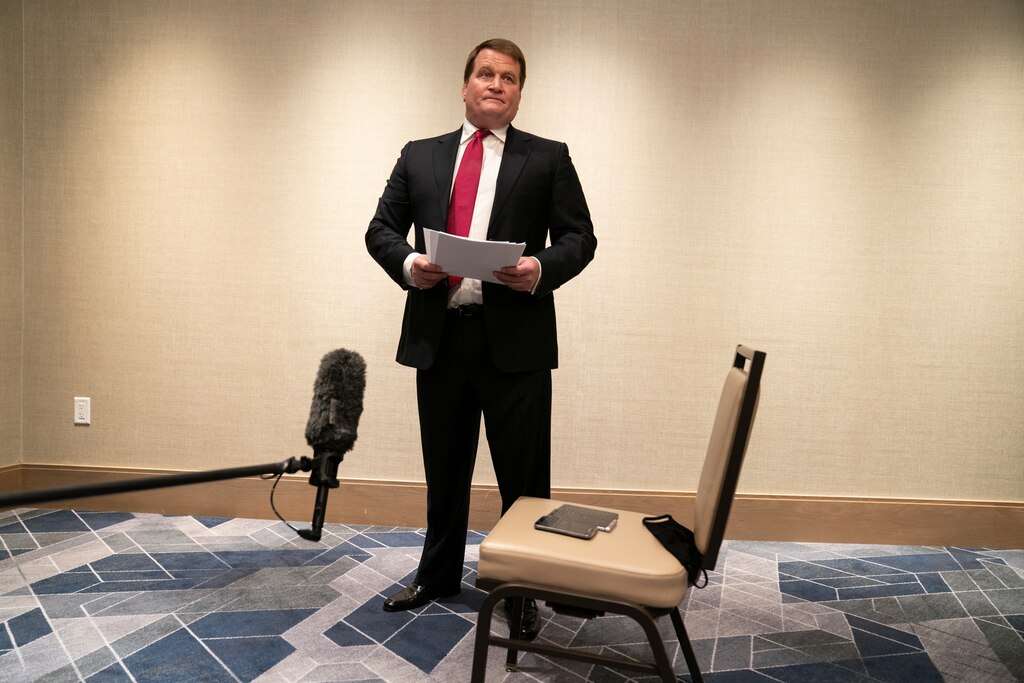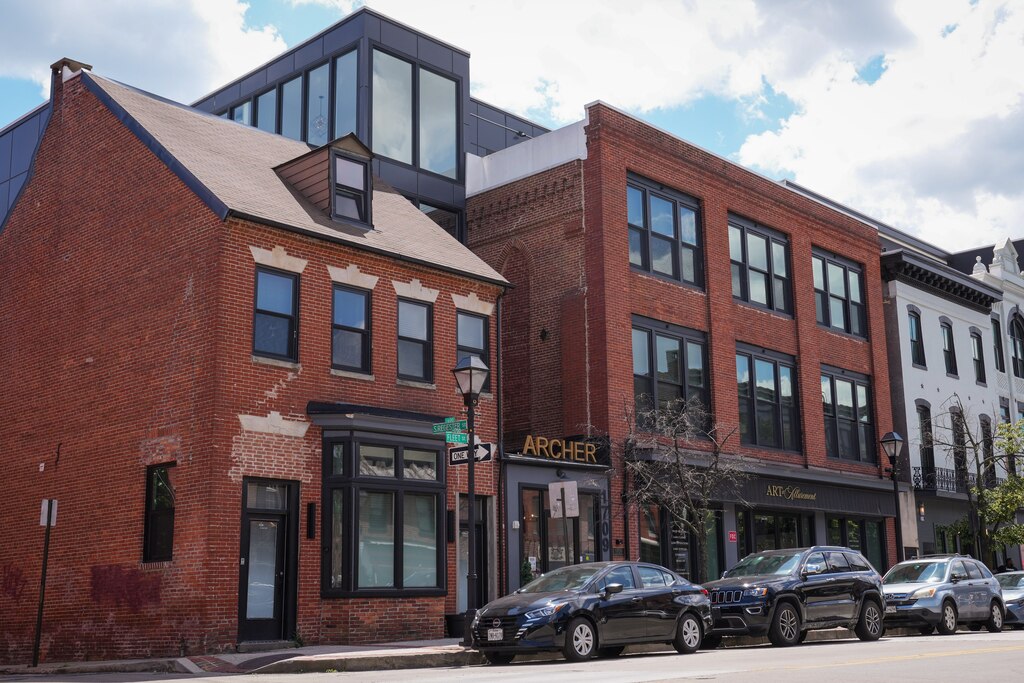Brandon Chasen on Wednesday faced almost three hours of questioning under oath about the implosion of his Baltimore real estate and development company.
U.S. Bankruptcy Judge Nancy V. Alquist in April granted a petition from three of Chasen Construction LLC’s creditors — Sandy Spring Bank, Southland Insulators of Maryland Inc. and Ferguson Enterprises Inc. — to force the business into Chapter 11 reorganization bankruptcy.
And in July, Chasen personally agreed to enter Chapter 7 liquidation bankruptcy and later disclosed that he owes more than $71 million.
The company’s bankruptcy hearing with creditors drew Chasen, 39, and a resident of North Baltimore’s affluent Guilford neighborhood, into a conference room at the Edward A. Garmatz U.S. District Courthouse.
Here are five takeaways from the court appearance:
Chasen’s take on how his firm fell apart
Toward the beginning of the meeting, Hugh Bernstein, a trial attorney for the Office of the U.S. Trustee, asked Chasen to explain in his own words how the business ended up in bankruptcy.
“Chasen Construction was really at the will of financing through getting paid through construction loans and other types of debt instruments to complete those projects,” Chasen said.
The company, he said, had about five large construction projects going on at the time, including One Calvert Plaza, the historic Meyer Seed Co. warehouse and a nearby property at 1400 Aliceanna St.
The banks for each of those projects had a 10% reserve holdback, which he said equated to about $8 million.
“We never really held back anything on our reserves to try to keep our subcontractors, vendors, everything motivated, but the shortfall, cash shortfall and that gap became so severe that we were unable to continue to operate,” he said.
Chasen noted that interest rates rose from 2% to 8%.
So Chasen said the firm needed either additional capital or equity from ownership for those loans, and “eventually, agreements couldn’t be reached and funding stopped from the bank, so everything was kind of cut off.”
Hunter Biden connections
Tony Bobulinski, a former business associate of Hunter Biden, was involved in multiple deals with the company.
Chasen said he did not know off the top of his head how much Bobulinski invested in the firm.
Bobulinski, he said, put money into several properties in Mount Vernon, the historic center of Baltimore.
Alan Eisler, Bobulinski’s attorney, asked about an email Chasen sent in February 2024 to his client in which he apologized for not being fully transparent.

At first, Chasen said he didn’t recall the background behind the email.
Eisler pressed on, reading part of the email out loud: “I must take full responsibility for a decision I made regarding the refinancing of the seven properties on February 22. Regrettably, I opted to allocate the proceeds toward our under-construction projects in what turned out to be an ill-advised gamble.”
“What does that mean?” Eisler asked.
Chasen explained that Bobulinski was eventually “made whole,” but some of the proceeds from the refinance intended for him first went into the purchase of a property at 523 S. Broadway.
Meanwhile, Devon Archer, another of Biden’s former business associates, served as a contractor for the company, acting as a financier, Chasen said.
One of the company’s properties on Fleet Street is named The Archer.
Archer accompanied Chasen and his business partner, Paul Davis, to Miami on at least one business trip.
Chasen said Archer brought money into the business, adding that the two met through their network.
“He connected us with a number of brokers in the U.K., others here in the states, for our financing efforts, as well as introductions to those private lenders,” Chasen said.
Records revealed that the company paid Archer $825,000. Credit card statements also reflected 96 charges related to travel, according to testimony.

In 2022, Archer was sentenced in U.S. District Court for the Southern District of New York to serve one year and one day in prison on charges that he took part in a conspiracy to defraud a Native American tribe.
Earlier this year, President Donald Trump pardoned Archer, saying that “many people have asked me to do this, they think he was treated very unfairly.”
“He was a victim of a crime, as far as I’m concerned,” Trump said.
Chasen said he has not heard from Archer in about six months.
Mr. Worldwide
U.S. Trustee Roger Schlossberg asked Chasen about a series of trips he made with Davis at the company’s expense.
Those included travel to Miami; Salt Lake City; Las Vegas; Beverly Hills, California; Los Angeles; and San Francisco; as well as international voyages to St. Andrews, Scotland; Monaco; Nice, France; London; Mykonos, Greece; and Ibiza, Spain.
Schlossberg noted that the trips sometimes included lavish excursions, including “repeated entries” to The Eden Club in Scotland, a destination golf course; one $49,000-a-week stay at a French Alps ski resort; and, in early 2023, a private plane rental.
Society Travel, which bills itself online as a luxury travel agency intended for clients with “refined and discriminating tastes,” appears frequently throughout the paperwork, Schlossberg said.
“Do you know how much you spent in 17 days?” Schlossberg asked about one of the European jaunts.
“I think you’ll tell me,” Chasen responded, “but I don’t know.”
“I’m afraid I’m obliged to: $231,000,” Schlossberg replied.
Chasen defended many of those trips as business opportunities to woo investors and meet people who were interested in helping to grow the company. He did not say whether the trips were considered successful.
Artwork in the storage unit
On one trip to San Francisco in July 2022, records show Chasen visited the ZK Gallery in San Francisco and spent $154,500.
Schlossberg inquired about the purchase. Chasen attributed it to artwork and furniture that is now housed in a storage unit near Fort Lauderdale, Florida.
About six months after the trip, Chasen later added, he transferred those items to a family trust and recorded them on the company’s taxes as a distribution.
In personal bankruptcy filings, Chasen only reported about $5,000 worth of artwork in his list of assets.
Schlossberg asked Chasen and his counsel to provide a full accounting of the items in storage, and reminded him “not to remove anything” from the unit without written permission.
Capt. Jacques’ big pay
Schlossberg questioned Chasen about the purchase of two units at the Four Seasons Private Residences Baltimore along with more than $740,000 in payments to Autohaus of Kingsville in a three-year period.
Chasen made other acquisitions that drew questions.
At one point, Chasen Cos. owned more than one boat, and cycled through at least three during its history: Limitless, AJ and Princess Lona.
One person whom Schlossberg referred to only as “Capt. Jacques” took home $161,000.
Chasen said he could not say whether that figure was the boat captain’s annual salary or included other expenses.
This article has been updated to correct the name of Tony Bobulinski's attorney.



Comments
Welcome to The Banner's subscriber-only commenting community. Please review our community guidelines.